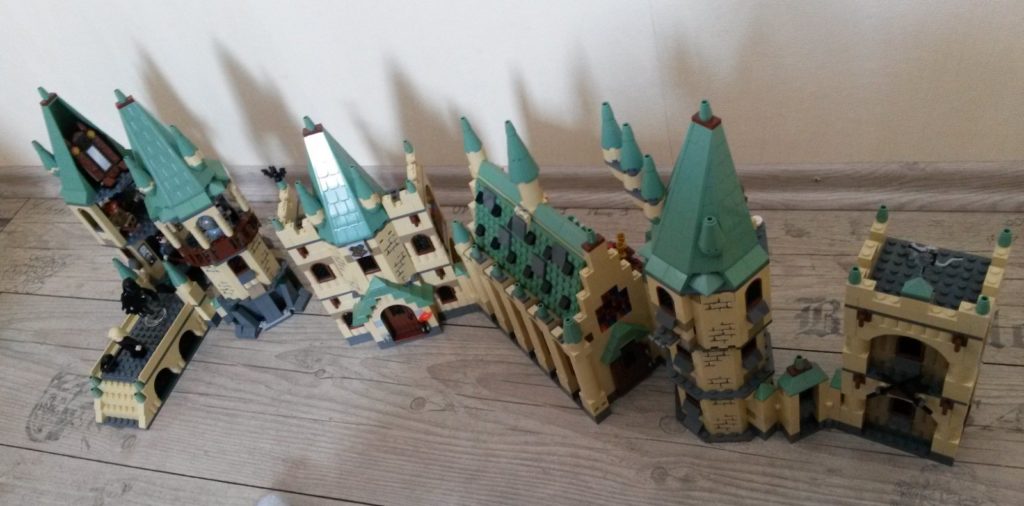I see so many posts about activities for the quarantine life. People finally read and watch the books and series that have been piling up, they clean, tidy up and organise their stuff, declutter their wardrobes, cook and bake, start artsy projects… I look around my apartment. I can’t find anything in urgent need of cleaning. I’ve just tidied up, and there isn’t a single item left I could get rid of. I’ve already made significant progress with my lists of things to read and watch.
Lego Hogwarts has just been entirely assembled and disassembled again. A number of my recent drawings now decorate the wall. Beep – the apple muffins are ready. Wherever I look, it’s ‘been there, done that’. But wait… it’s only been a few days of Corona. I realise I’ve already been living like this for the last couple of months, and not for the first time. I’m entirely used to this. This feels familiar. Structuring my day, being left to my own devices, a bit cut off from the world outside, carefully regulating how much news and external panic I consume, getting things done or just killing time, daydreaming, wondering about the meaning of life, keeping myself busy with few or no appointments. This is what I know, what I have already learned. This is something I can handle.
But people are afraid. People are dying, suffering, grieving, worrying. The news and social media are in overdrive, there is panic everywhere. And like most of us, I worry about friends and family who are at risk. I worry about myself. I worry about the future. I worry about the availability of water, food, and other necessities. So this doesn’t seem like a good environment for me and my anxiety disorder. Except in some way, it is. I worry, all the time, and about most things. I am often afraid. Sometimes there are weeks at a time where every appointment feels like an exam, every day like the world – my world – might end. But normally, the world is normal, disconnected from me in its carefree buzz of existence, with people going about their daily lives and routines while I feel like I’m in a perpetual state of exception, trying but unable to keep up with the world around me. Now the world finally matches my mental state. I hate this situation, but I also find it strangely comforting. I notice that I really needed the world to stand still for a bit, to not even have those few appointments I still managed for the last couple of months during which I struggled with physical health issues on top of my anxiety. Now I have time to breathe, to recover properly rather than just try to hang on, squeezing the experiments of what food my body might still tolerate in between days at uni. I even managed to get some work done at home for what feels like the first time in a while.
I am aware that I am relatively privileged with regard to this pandemic. I have the resources that I need and I can rely on the people around me, both in person and via electronic channels of communication. I don’t feel isolated. My existence is not threatened, nor does it feel threatened more than usual. The pandemic has had a reasonably small effect on my daily life, even forced upon me some much needed quiet. In the same way that this feels like a chance for me, it might also be one for the world at large. The daily lives of so many have been impacted by one thing, the habits of so many are forced to change at the same time, in small and in not-so-small ways. This can be a huge chance to establish healthier, more mindful ways of living, personal and public practices of care and social responsibility among all sorts of different people. A chance to improve health care systems, establish new measures that safeguard everyone’s livelihoods, foster global cooperation without capitalist interests. Being forced to pause and reconsider, being faced with the consequences of our way of life, we might realise that we want to change what we prioritise in the future – human connection, the environment, sustainability, equality, things that might be beneficial for all of us in the long run.
I realise that this is incredibly (and, for me, uncharacteristically) optimistic. The only thing safe to say right now is that there will be effects, multiple and varied, on most areas of life. Think about how 9/11 influenced our world – from international politics to travel and safety regulations to academic thought to what we personally expect the world and the future to be like. It makes sense to distinguish between pre- and post-9/11 in many fields and genres. We will be researching this, thinking, talking, reading, and writing about this for years to come. But while this crisis has made global catastrophes and apocalyptic scenarios imaginable, it has also made a variety of positive responses imaginable – in fact it has made some of them real already. And the mere fact that I am sitting at home right now, thinking about the possible positive outcomes and the productive potential of this, gives me hope. Because actively guiding my thought processes and imagining the future in positive, hopeful terms – be it in my head or in conversation, in a journal or on our blog – is certainly a new habit for me, one that I value, that contributes to my well-being, that motivates me to act, and that I intend to continue to practise and keep alive beyond this virus.
Jenny
